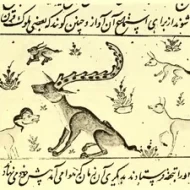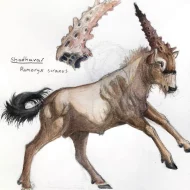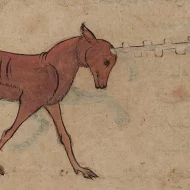Shadhavar : The Arabian Unicorn
Listen
At a glance
| Description | |
|---|---|
| Origin | Arabian Mythology |
| Classification | Hybrids |
| Family Members | N/A |
| Region | Middle East |
| Associated With | Music, Magic |
Shadhavar
Introduction
The legendary creature known as the Shadhavar, alternatively called Âras in medieval Muslim bestiaries, emerges from the rich tapestry of Arabian mythology. This mythical being, dating back to the medieval ages, draws comparisons to the unicorn, characterized by its singular, imposing horn. The Shadhavar, akin to a unicorn, possesses a majestic horn that emits a mesmerizing melody, weaving enchantments through the air and entrancing all who are fortunate enough to hear it. Its enduring legend, echoing through the annals of time, stands as a poignant reminder of the potent magic inherent in nature’s melodies and the timeless allure of the mysterious and the unknown.
Physical Traits
The Shadhavar is distinguished by its singular giant horn, adorned with 42 branches that gracefully fan out from its base. These branches, possessing a unique hollowness, produce a delightful sound when the wind gently courses through them. This distinctive characteristic of the Shadhavar becomes the focal point of numerous legends, each narrating the enchanting music that emanates from its magical horn as the wind weaves through its myriad branches.
Envision a creature of unparalleled grace, reminiscent of a gazelle – swift, elegant, and draped in a coat of iridescent pearl or the purest amber. Crowned atop its head is a solitary, spiraling horn, aspiring towards the celestial heights. Some speak of its crafting from moonlight, while others hush in reverence of polished ivory. Yet, the true marvel lies in the intricacies of its hollow branches. Whether numbered at forty-two in some tales or seventy-two in others, each delicate flute-like branch whispers secrets to the wind.
Family
The Shadhavar stands as a solitary figure within Arabian mythology, devoid of any known relatives or familial connections. Its existence is singular and unparalleled, devoid of shared characteristics with other mythical creatures. The Shadhavar, wrapped in an aura of mystery, remains an enigmatic entity even within the context of its hypothetical family tree.
Some tales suggest a distant kinship between the Shadhavar and the majestic Simurgh, the mythical bird celebrated in Iranian folklore, sharing a common thread of grace and a penchant for creating enchanting melodies. Alternately, there are those who propose a familial link to the unicorn, drawing parallels from the shared presence of a singular horn that echoes an ancestral connection. Nevertheless, the Shadhavar remains distinct in its magical essence, a creature unto itself, conceived from the very breath of the desert and the echoes of ancient narratives.
Other names
Besides being recognized as Shadhavar, this mythical creature also goes by the name Âras. The nomenclature can vary depending on the region and the particular legend in which the creature is featured. Alternatively, some refer to it as Sadhuzag, a name that hints at a potential concealed ferocity beneath its outwardly graceful demeanor.
Powers and Abilities
The primary prowess of the Shadhavar resides in its extraordinary horn. As the wind gracefully flows through the 42 hollow branches of this unique appendage, it produces a delightful sound that possesses the enchanting ability to captivate and hold the attention of various animals. What sets this mystical creature apart is its capacity to manipulate this sound to evoke different emotions. Played on one side, the horn emits a cheerful tune, while when played on the other, it generates music so melancholic that it can bring tears to the eyes. This exceptional power to govern emotions through music stands as a distinctive attribute of the Shadhavar.
The true potency of the Shadhavar, however, lies in the profound impact of its song. The melodies carried by the wind can charm and mesmerize, casting a spell that penetrates deep into the recesses of the heart. It possesses the ability to entice prey with bewitching tunes, pacify turbulent storms through its soothing harmonies, and even heal fractured hearts with its whispered melodies. Some narratives speak of the horn, when played by human hands, producing sorrowful melodies capable of inducing freely flowing tears. Others allude to its mystical capability to grant wishes and unveil concealed truths, rendering it a coveted prize for those courageous enough to embark on the quest to encounter it.
Modern Day Influence
While the Shadhavar may not boast the same widespread recognition as other creatures in Arabian mythology, its distinct attributes have left an enduring imprint. The concept of a being capable of producing entrancing music that captivates its audience is a potent one, serving as an ongoing source of inspiration for contemporary reinterpretations and adaptations. The Shadhavar, in this regard, stands as a testament to the vast and diverse realm of Arabian mythology, with its narrative persisting in various forms today.
Beyond its artistic influence, the Shadhavar carries a profound and symbolic resonance. It symbolizes the potency of music to transcend barriers, offer solace to the weary, and evoke awe in the face of the unknown. In a world frequently marked by discord, the Shadhavar’s melody emerges as a beacon of hope, reminding us that beauty and enchantment endure, patiently awaiting discovery in the rustle of the wind and the melody of our own hearts.
Related Images
Frequently Asked Questions
What is lorem Ipsum?
I am text block. Click edit button to change this text. Lorem ipsum dolor sit amet, consectetur adipiscing elit. Ut elit tellus, luctus nec ullamcorper mattis, pulvinar dapibus leo.
What is lorem Ipsum?
I am text block. Click edit button to change this text. Lorem ipsum dolor sit amet, consectetur adipiscing elit. Ut elit tellus, luctus nec ullamcorper mattis, pulvinar dapibus leo.
What is lorem Ipsum?
I am text block. Click edit button to change this text. Lorem ipsum dolor sit amet, consectetur adipiscing elit. Ut elit tellus, luctus nec ullamcorper mattis, pulvinar dapibus leo.
What is lorem Ipsum?
I am text block. Click edit button to change this text. Lorem ipsum dolor sit amet, consectetur adipiscing elit. Ut elit tellus, luctus nec ullamcorper mattis, pulvinar dapibus leo.
What is lorem Ipsum?
I am text block. Click edit button to change this text. Lorem ipsum dolor sit amet, consectetur adipiscing elit. Ut elit tellus, luctus nec ullamcorper mattis, pulvinar dapibus leo.








